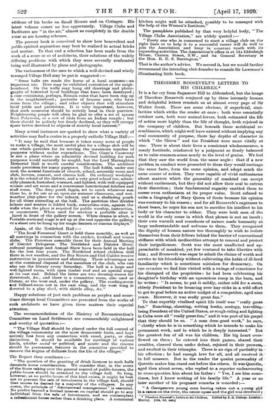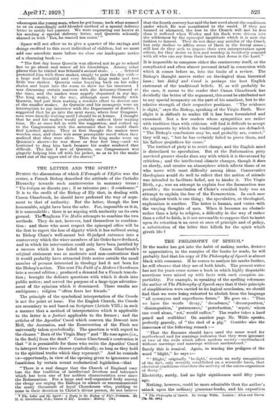THEODORE.. ROOSEVELT'S LETTERS TO HIS CHILDREN.*
• Theodore Roosevelt's Letters to Ms Children. Edited -by J. B. Bishop.. London 3 Murray. 110s. ed. net.] IT is a far cry from Sagamore Hill to Abbotaford, but the image of Theodore Roosevelt conjured- up by these intensely human and- 'delightful letters reminds- us at almost every page of Sir Walter Scott. There are some obvious, if superficial, simi- larities which strike the reader at once : both were essentially outdoor men, both were animal-lovers', both -estimated the life of action more highly than the life of thought, both rejoiced in the -company of children. But beneath• these accidental .re- semblances, which might well have existed without implying any real community of purpose, there lay, depths of character in which " the- Shirra " and the President were• more vitally at one. - There is about their lives a consistent wholesomeness, a manly fortitude, reinforced by a judgment so firmly balanced as to raise common-sense nearly to the level of genius. We feel that they saw the world from the-same angle: that if a new problem in conduct were presented to them they would envisage the same facts, form the same opinion, and adopt much the same course- of action. They were capable-of vivid enthusiasms about matters which the generality of mankind can accept without excitement, but they did not allow their zeal to outrun their discretion.; their fundamental sagacity enabled them to assess., even_ enthusiasm at its proper value. Scott refused' to write a biography of Mary Queen of Scots because his opinion weaeontrary-to his reason:: and for all Roosevelt's eagerness to shoot bears; he urges his son not to sacrifice his intellect to his body or his character to -either. They, were both men of the world in the only sense in which that phrase is not an insult ; their own warmth and roundness-of nature made humanity at large understandable and welcome- to them. They recognized the- dignity of human nature too thoroughly to wish to isolate themselves from their fellows behind the barrier of conventional stiffness with which mediocrities attempt to conceal and protect their insignificance. Scott was -the most unaffected and ap- proachable of mankind, yet few ventured to take liberties with him ; and Roosevelt was eager to admit the claims of worth and service to his friendship without cultivating, he habit of ill-bred familiarity which is sometimes mistaken for democracy, On one occasion we find him visited with a twinge .of conscience for his disregard of the proprieties : he had been celebrating his daughter's birthday with an uproarious romp in the barn, and he: writes : " It seems, to put it mildly, rather odd for a stout, elderly President to -be bouncing over hay-ricks in a :wild effort to -get to goal before an active midget of a competitor, aged nine years. However, it was really great fun."
To that superbly vitalized spirit life itself was " really great fun," Ranching„_ shooting, writing books, zoology, travelling,. being President of the. United States, or rough-riding and fighting in Cuba were all " reallygreatfun," and it was part of his gospel that they should be so. " A -man does- good work," he says, "chiefly when he is -in something which he intends to make his permanent work; and in which he is deeply interested." But the greatest fun of all was his children. His big heart over- flowed on them ; he entered into their games, shared their troubles, cheered them under defeat, rejoiced in their prowess, and exulted in their triumphs. There is no sign -of partiality- his affection he had enough love for all, and all received it - in full measure. But to the reader the quaint 'personality of Quentin makes him stand out before the- others. It was Quentin, aged then 'about seven, who replied to -a reporter endeavouring to cross-question him about his father " Yes, I see him some- times, but I know nothing of his family life." A year or so later another of his pregnant remarks is recorded :- " A Georgetown young man having ,taken out a -young •girl in a canoe on the river, the canoe upset and the girl was drowned.; sehereuponstho young Mani 'wherrhe got home, took what-seemed to us an exceedingly cold-blooded. method of a special delivery letter to notify her parents. We were expressing our horror at his sending a special -delivery- letter, and Quentin solemnly chimed in. with `. Yes, .he.wasted ten cents.' "
-Space Will not allow us to give a. quarter of the.sayings .and doings credited to this most individual of children, but we must add one anecdote more before we close our inadequate notice of a charming book :—
• " The first day home Quentin was allowed not to go to school but -to go-about and renew all his friendships.. Among other places that he visited was Sehmid's animal store.. . - Schmid presented.him with three snakes, simply to pass the. day with— a large and beautiful and very friendly king snake and two little wee snakes. Quentin came hurrying back on his roller skates and burst into the room to show me his treasures. I was discussing certain _matters with the Attorney-General at the time, and the snakes were eagerly deposited. in my. lap. The . king snake, by. the - way, although_ most -friendly . with Quentin, had just been. making a resolute effort to devour one of the smaller --.snakes. As Quentin andhis menagerie were an interruption to my interview with .the Department of Justice, I suggested that he go into the next room, where four Congress- men were drearily waiting until I should be at leisure. I thought that he -and- his -snakes would probably enliven their- waiting time. He. at -once fell in with the suggestion, and rushed up to the Congressmen with the assurance -that- he would there find kindred spirits. They at first thought the snakes were wooden ones, and there was some perceptible recoil when. they realized that they were alive. Then the king _snake. went up Quentin's sleeves-he . was three or four -feet long—and - we hesitated to . drag. him back- because his scales rendered that difficult. They-last I saw of Quentin, - one Congressman was gingerly helping him off with his jacket, so as to let the snake crawl out of the upper end of the eleeve."



































 Previous page
Previous page